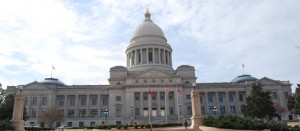 By Steve Brawner
By Steve Brawner
© 2017 by Steve Brawner Communications, Inc.
To sum up the first few weeks of the legislative session: Republicans mostly agree on most of the big things and the few remaining Democrats might as well have stayed home. But that could change – particularly the first part.
After the 2016 elections and three party-switchers, Republicans enjoy a majority of 102 out of 135 seats, and so far, that majority has held together. There was a difference of opinion on whose taxes to raise to offset a tax cut for military retirees, but it was largely settled without too much conflict. It was one of the few instances this session when Gov. Asa Hutchinson did not get exactly what he wanted. Instead, he only got mostly what he wanted.
On the big issues, Democrats have been reduced to filing bills that go nowhere, making fruitless speeches, and losing committee votes. Unfortunately for them, one the most significant bills passed by a Democrat this session may be one by Rep. Greg Leding, D-Fayetteville, that would name the Arkansaurus fridayi the state dinosaur.
In hindsight, it might have been a mistake for Democrats to stack the House Revenue and Taxation Committee before the session. In November, they sacrificed every other committee and managed to obtain an 11-9 majority there before Republicans could get organized to stop it. But a few weeks later, Rep. Joe Jett of Success switched parties and became a Republican, making it 10-10, and then he was named chairman of that committee.
The Democrats’ move was a bit combative for a party that’s outnumbered three to one, and it may have made it a little harder for its members to get anything done. Individually, they might would have been better off just exercising influence where they could.
All of this could change as the Legislature considers controversial bills and as everyone’s patience begins to fray. In the past, Republicans have split over the private option, the program that uses federal dollars to purchase private health insurance. A big fight on that issue does not appear to be looming.
However, other issues will pit competing conservative values against each other, causing Republicans to split and allowing Democrats at least to vote with the majority on a big issue. For example, medical marijuana is already splitting Republicans, with some saying the party must honor the November vote of the people while others argue that federal law is being violated and therefore so is the Constitution they took an oath to protect.
Another bill that’s splitting Republicans is House Bill 1035, the Arkansas Healthy Food Improvement Act, by Rep. Mary Bentley, R-Perryville. It would prohibit government food program beneficiaries from using their cards to purchase unhealthy food. It passed the House, but not by much, 55-39. Democrats are against it. Some Republican supporters say welfare recipients should not be using taxpayer dollars to buy soda pop and candy. Republican opponents, however, say it’s an expensive mandate on private business (Walmart is against it) that lets bureaucrats tell people what they should eat. We’ll see what happens in the Senate.
Theoretically, House Bill 1249 by Rep. Charlie Collins, R-Fayetteville, is another one of those bills. It requires college campuses to allow their staff members to carry concealed weapons if they have a permit, regardless of what the campuses think is best – and none think it is best. Collins freely admits the issue puts two conservative principles in conflict, security versus local control. But the legislation is pro-gun and supported by the National Rifle Association, which is a powerful tiebreaker. It’ll pass.
Inevitably, there will be issues that split 102 Republicans, and when that happens, the 33 Democrats will have a chance to be on the winning side and, on rare occasions, actually be the swing vote. So while the Arkansaurus fridayi may soon be the state dinosaur, Democrats won’t become extinct.
Steve Brawner is an independent journalist in Arkansas. Email him at brawnersteve@mac.com. Follow him on Twitter at @stevebrawner.